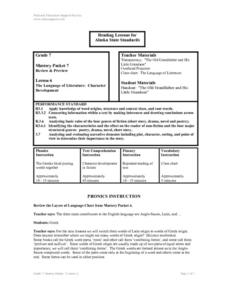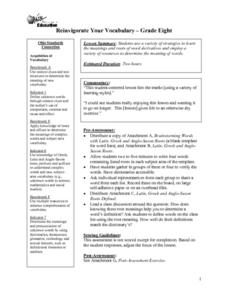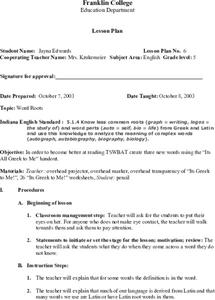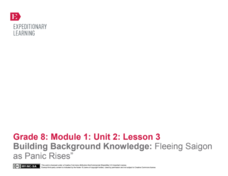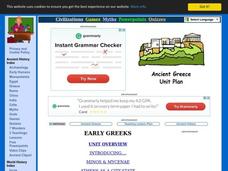Curated OER
Rooting One's Way to Meaning
Discover the Virtual Thesaurus with your class. They use the Virtual Thesaurus to assist them in an inquiry-based approach to discovering the meanings of some common Latin and Greek roots. Each child then teaches a particular root and...
Curated OER
Superhero Comic Strip Using Greek and Latin Roots
Students create comic strips in groups and explain to the class the Latin and Greek roots of their superhero names. In this Latin and Greek root lesson plan, students get into groups and come up with superhero characters to integrate...
Curated OER
Rooting One's Way To Meaning
Students use a thesaurus on the internet to explore the meanings of Greek and Latin roots. They find definitions of given words, draw a concept map for root words, and write four synonyms for each word. Students discover how Latin and...
Curated OER
Root Words
Eighth graders practice finding the meaning of words by analyzing the root word. In this root word lesson, 8th graders review a chart of roots, words, and meanings. Students find and list words that have the root of 'geo,' 'terra,' and...
Curated OER
Babylonian Square Roots
Students are introduced to a method for finding square roots used by the Babylonian people of Mesopotamia. The method involves dividing and averaging, over and over, to find a more accurate solution with each repeat of the process.
Curated OER
Greek Origins and Character Development
Seventh graders examine words of Greek origin and discuss character development in fiction. They read a list of Greek word parts and create words on a worksheet. Students then read and discuss an informational handout about character...
Curated OER
Once Upon a Word
Students explore the derivations and usage of common slang terms. Through internet research and discussion, students consider the Latin and Greek roots of contemporary slang terms. Groups complete an etymology chart documenting their...
Curated OER
The Origin of Words
Help your class identify known words in a given passage. They will read a passage from the Greeks and Romans and identify five words still in use today. Then define four of the five words.
Curated OER
The Star Fisher
What a terrific way to discuss racism in the 1920's. Learners read a story called The Star Fisher by Laurence Yep. It is about a Chinese American girl who experiences racism and prejudice after moving from Ohio to West Virginia. Learners...
Curated OER
Reinvigorate Your Vocabulary
Eighth graders participate in a variety of activities to examine the meanings and roots of word derivatives and the meanings of words. Using context clues, they determine the meanings of words omitted from a passage and complete a prefix...
EngageNY
Mid-Unit 1 Assessment: Human Rights Vocabulary and Common Prefixes
Here is a mid-unit assessment for a group of lessons studying the Universal Declaration of Human Rights (UDHR). The first half of this instructional activity calls for several forms of review. Your class will review the content of the...
Curated OER
Where Do Words Come From?
Young scholars examine the foreign-language roots of various English words. Using the dictionary's word derivation notes and abbreviation key, they develop a list of words with a foreign-language origin, and create a class dictionary.
Curated OER
Deep Roots of Ancient Greece
Students investigate Greek contributions to modern America. In this ancient Greek influence lesson, students watch videos, listen to lectures, and conduct research regarding ancient Greek ideals in order to analyze and trace Greek...
EngageNY
Research Tasks: New Words, Relevant Information, Revision
Word builders. Scholars participate in a mini instructional activity about affixes. They then complete a research vocabulary organizer and share their definitions of the words with the class. They gather more evidence for their research...
Curated OER
Word Roots
Fifth graders discover that for some words, the definition is actually in the word and that much of our language is derived from Latin and many words have Latin roots. They look at the definition part of the worksheet and go over it...
Curated OER
It's Greek to Me!
Fifth graders are introduced to a variety of Greek root words. Individually, they are given a list of prefixes and suffixes to make new words. After creating each word, they use the dictionary to define it. To end the lesson, they...
EngageNY
Building Background Knowledge: "Fleeing Saigon as Panic Rises”
How can scholars better understand the refugee experience? Pupils read Fox Butterfield's article "Panic Rises in Saigon, but the Exits are Few" and connect it to the novel Inside Out & Back Again. They annotate the text, looking for...
Curated OER
Greek, Latin and Anglo-Saxon Roots to Better Vocabulary
Seventh graders review the concepts of affixes and roots. They practice common Greek, Latin, and Anglo-Saxon ones which are used to form many words in English. Students develop an awareness of the formation and evolution of words.
Curated OER
Journey to Understanding Vocabulary
Learners examine word parts. In this word study lesson, students practice breaking words into parts and using their knowledge of Greek roots, prefixes, and suffixes determine the words' meanings.
EngageNY
Close Reading: The Introduction to the Universal Declaration of Human Rights
As part of a group of lessons, your class will return to the primary text for this unit, the Universal Declaration of Human Rights. Key vocabulary as well as close reading strategies continue to be the focus skills; however, this lesson...
Curated OER
The Greek Gods
What were the early Greek myths? Have elementary young scholars examine the Persian Wars and read various Greek myth in order to identify the cause and the results of the Persian Wars. Myths, activities, simulations, and a unit plan are...
Curated OER
Tracing the Roots of Modern Cities
Learners identify several key inventions and other forms of technology that were part of city life during the classical Roman and Greek periods. They report on one characteristic or invention that is shared by modern and ancient cities.
EngageNY
Summarizing Complex Ideas: Comparing the Original UDHR and the "Plain Language" Version
The eighth lesson plan in this series continues the focus on vocabulary and increasing young readers' awareness of academic language. Pairs of learners participate in a short vocabulary review activity called Interactive Words in which...
Curated OER
Greek Prefixes In Science
Seventh graders look into their science textbooks to find words that utilize the Greek prefixes, "anti," "epi," "endo," and "micro." Student pairs complete a worksheet embedded in the plan where they list as many of these words as they can.







